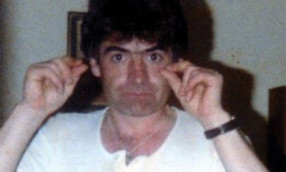
Nine days after killer Angus Sinclair was found guilty of World’s End murders, police are urged to investigate his brother-in-law’s links to other missing women.
A former top cop says it’s inconceivable Angus Sinclair’s alcoholic brother-in-law, who died in 1996, only committed one serious crime. Now there are calls for a cold case review into his activities in the 1970s, 80s and 90s.
Sinclair, 69, was convicted 10 days ago of the rape and murder of teenagers Christine Eadie and Helen Scott in October 1977.
The DNA of Sinclair and Hamilton was recovered from the bodies of the girls and from each of the five ligatures used to restrain and strangle them. Lord Advocate Frank Mulholland admitted in court while summing up the evidence that his only regret was that Hamilton had died and was not sitting in the dock beside Sinclair.
Sinclair, also convicted of the culpable homicide of Catherine Reehill, seven, in 1961, and the murder of Mary Gallagher, 17, in 1978, is believed to have acted alone in a number of other murders in Strathclyde in 1977, where the modus operandi matches the World’s End case.
Anna Kenny, 20, Hilda McAulay, 36, and Agnes Cooney, 23, had all been bound and gagged in similar fashion to Helen and Christine, and Anna and Hilda had also been strangled by ligatures.
The major difference was Agnes had been stabbed in the throat and had not been raped, but she was a powerful woman and there were signs she had put up a considerable fight so might have been stabbed to put an end to the struggle.
Ligatures and other productions in the three cases were lost long ago by Strathclyde Police, ruling out the forensic work that proved Sinclair and Hamilton killed Christine and Helen.
But today we can reveal possible links between Hamilton and these murders.
Hamilton’s then wife-to-be, Wilma Sutherland, was Anna’s best friend and had been out with her in the Hurdy Gurdy pub on the night she vanished. Their movements would have been known to Hamilton.
Hilda was bound with a type of industrial string sold to tradesmen, which from descriptions in statements from the time matched string found in the back of a car Sinclair had once dumped in a quarry, but which police divers recovered during the investigation.
The string from the van was identified and one of Hamilton’s former employers confirmed his company had used it at the relevant time.
There were also numerous murders of other young women in Strathclyde following Sinclair’s incarceration, initially for sex crimes against little girls, in 1982 and up to Hamilton’s death from heart failure in 1996.
Many victims were prostitutes and the majority of the cases remain unsolved.
Now two of Scotland’s most senior retired police chiefs are calling for any forensic evidence from these crimes to be compared with Hamilton’s DNA profile.
Tom Wood, 65, was Deputy Chief Constable of Lothian and Borders Police when he led Operation Trinity, leading directly to Sinclair’s prosecution for the World’s End murders.
He said: “It was such a brutal and devastating crime. It’s virtually inconceivable that an offender’s first crime is a double rape and murder, or that he commits such a crime, gets away with it and never reoffends.
“Sinclair was 10 years older and I have no doubt he was the dominant partner, but there is no doubt Hamilton participated fully and, considering the general nature of such offenders, it’s hard to believe there was never any build-up, or any repeat later in his life.”
The retired officer has written a book, The World’s End, about the brutal murders and a revised edition is due to be published this week.
Labour’s justice spokesman at Holyrood, Graeme Pearson, former Assistant Chief Constable at Strathclyde and later head of the Scottish Crime and Drug Enforcement Agency, also said he would be astonished if World’s End had been Hamilton’s only crime.
Mr Pearson, 64, added: “I would hope that Police Scotland will evaluate Gordon Hamilton’s life and all his background to ascertain whether he could be linked to the unsolved murders of young women at that time.”
The Crown Office and Police Scotland last night confirmed that cold case reviews are now carried out routinely.
A Police Scotland spokesman said: “During the Operation Trinity period, the investigation looked at all homicides in Scotland up until the period of Gordon Hamilton’s death to consider if he would be potentially relevant to any investigation.
“Clearly, we will seek to retain this sample in order that any future unresolved case work will have forensic data to compare if new information or advances in forensic science becomes available.”

Enjoy the convenience of having The Sunday Post delivered as a digital ePaper straight to your smartphone, tablet or computer.
Subscribe for only £5.49 a month and enjoy all the benefits of the printed paper as a digital replica.
Subscribe